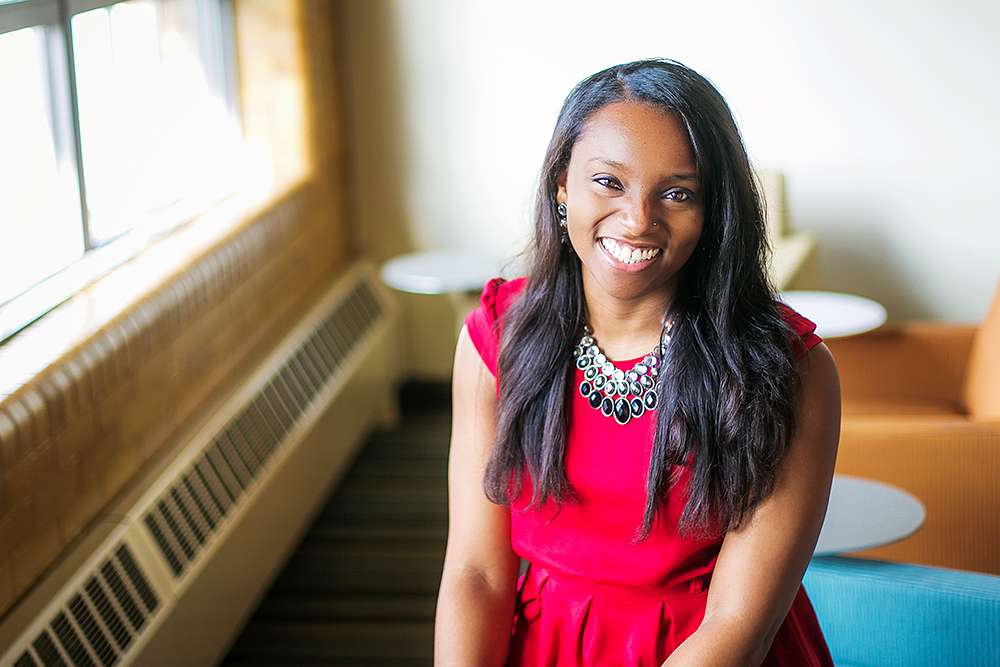Michelle Brown smiles as she rattles off the long list of the classes, practica, research, and student groups on her schedule. She is a doctoral student in her third year at the Institute of Child Development’s track in developmental psychopathology and clinical science.
Brown came to the U with a wealth of experience in her field, including a year as a family counselor in Memphis. Taking a break between undergraduate and graduate school wasn’t a part of her initial plans, says Brown, but it gave her the chance to sharpen her focus after earning her bachelor’s degree in psychology.
“That two-year gap gave me more time to figure out what I’m interested in researching in the first place,” she says. “One of those things is revictimization.”
If a person is assaulted, abused, bullied, or otherwise victimized once in their life, there is a high risk of it happening again, which the study of revictimization aims to understand. Brown is currently leading research that looks at what factors influence the relationship between being victimized in childhood and again in adulthood.
Brown and her colleagues gather some of their data from the Tubman Center in Minneapolis and Maplewood, an organization that provides support services to women and families experiencing dating violence or domestic abuse. In one study, for example, mothers at the shelter were asked to describe their children’s aggressive behaviors toward their siblings and them.
In the study she is currently leading, young adults are asked about their victimization experiences in childhood and adulthood and about factors such as social support and experiences with parents. Brown wants to know what factors, related to a person’s family and social environment, may help to prevent negative outcomes such as revictimization.
Research centered around children and families has become an integral part of her work at ICD.
“Working with the entire family really opened my eyes to see why the kids were acting in certain ways,” says Brown. “Being a family counselor made me realize how important it is to look at the entire family and try to help make some changes in the family structure.”
Brown hopes to expand her revictimization research and include it in her dissertation. This year she was awarded a fellowship from the National Science Foundation that will help her do that. In addition to looking at how family and social factors influence revictimization, she plans to include analysis of how these factors, along with physiological regulation, impact revictimization and health outcomes, both mental and physical. A lot of research in child psychology focuses on mental health, says Brown, but that’s not the whole story.
“There’s a lot of research to suggest that abuse, maltreatment, and victimization profoundly affect your physical health, as well,” she says.
Lifelong desire
Working with at-risk populations, especially children, was a practice Brown valued long before she came to the University.
“I pretty much knew I wanted to work with kids, even when I was a kid myself,” she says. “My view was, ‘I can be a teacher or a child’s doctor.’”
Brown began her undergraduate career as a psychology major with pre-med intentions, but her interests pulled her away from medical school. Serving as a tutor and an academic mentor with disadvantaged and under-resourced children clued her in to how much she enjoyed working with kids and teenagers who have experienced adversity.
“Adolescents are my dream population to work with,” she says with a laugh.
After an adviser told her about developmental and clinical psychology, she finally knew what she wanted to pursue. The many strengths of the Institute of Child Development drew her to Minnesota.
“The community mentor model of getting to have more than one adviser was really appealing to me,” Brown says, whose advisers are faculty members Dante Cicchetti and Canan Karatekin. “Both my advisers are great, and they really complement each other.”
Protective factors
Brown cites her relationship with her father as a lifelong source of inspiration and motivation. When she was in high school, she admits her dad paid her for every “A” she earned, but if she got a “C” she owed him. Now that she’s in graduate school the bribes are over, but she says her dad still expects her to work hard and achieve.
When Brown made the move to the Twin Cities, her dad was by her side, and it reminded her of all the ways he helped her prepare for this part of her life.
“My dad helped me drive from Baltimore to Minnesota—it was a 16-hour drive,” she remembers. “When I dropped him off at the airport, that’s when it really hit me—‘I’m going to be here for at least five years.’ And I got really emotional, not because I was sad or anything but because I thought, ‘Wow, I’m really getting a Ph.D.’”
Now Brown hopes to help other children and families find support the way her family supports her. One of her goals is to inform researchers, advocates, and family and social support networks about the tools they can use to prevent negative outcomes for victimized children and adolescents and help to improve victims’ futures.
“You hear about all of the bad things that victims are at risk for,” Brown explains, “so I really want to understand what protects them.”
Brown cares deeply about the futures of the kids and families she studies. It inspires her to conduct research that helps them. It also motivates her in the face of the trauma experienced by the children with whom she works and her own stressful schedule.
“I want kids who have been victimized or who have been abused or maltreated to not have this fate that people expect,” she says. “The experience that you have in childhood doesn’t have to define you for the rest of your life. You can overcome it, and you can emerge resilient.”
Read more about the Institute of Child Development and Michelle Brown.
Story by Ellen Fee | October 2015
